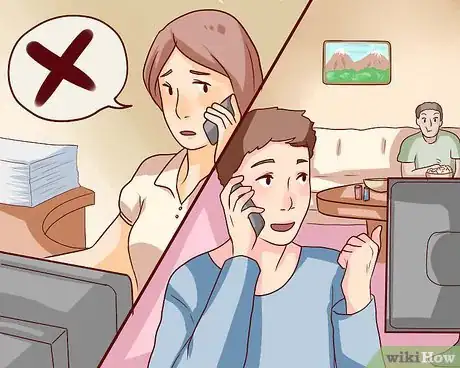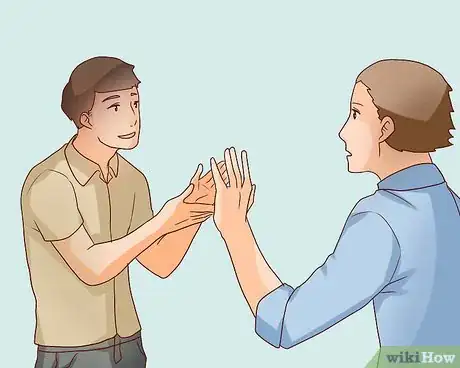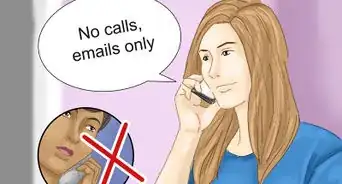This article was co-authored by Christy Irvine, PhD. Dr. Christy Irvine is a Licensed Clinical Psychologist and the owner of her private practice out of Portland, Oregon. With over 10 years of experience, she specializes in individual and couples therapy using various techniques including Emotionally Focused Therapy (EFT), Acceptance and Commitment Therapy (ACT), Interpersonal-Process Therapy, and Cognitive Processing Therapy (CPT). Dr. Irvine holds a B.A. in Psychology from Whitman College and a Ph.D. in Clinical Psychology from The University of Connecticut.
There are 12 references cited in this article, which can be found at the bottom of the page.
This article has been viewed 64,467 times.
There are an infinite number of reasons you may find yourself having to say no to requests from family, friends and work. No can be a very difficult word for some people to say. Many people tend to have trouble saying no.[1] Whether you are male or female, knowing how to say no nicely can have a huge impact on any kind of relationship. There are things you can do to make the task easier while preserving your own sanity. Learn to ask for time, avoid direct confrontation if you can, and be as honest as possible.[2]
Steps
Saying No in Daily Life
-
1Understand why saying no is difficult. Most of us have learned from an early age that saying yes is easier and gets favor and approval from family. This taps into a deep need to please our parents that is tied with love and fears of abandonment.[3] Or we may fear alienating and losing our spouses or significant others. With friends, saying no can cause misunderstandings or risk hurt feelings. Then there's the worry that saying no at work could make you look bad or keep you from a promotion.[4]
- Saying yes is great in theory, but often causes problems if we say yes to more than we can manage.
- To be more assertive, you'll need to change the way you interact with people. Don't worry—this gets easier with practice![5]
-
2Learn why saying no is important. Learning to say no nicely is a pathway to establishing and maintaining healthy boundaries. If you take pride in caring and doing things for others, saying no often feels uncomfortable. You may find that you say yes too often and end up anxious or stressed because you took on too much.Advertisement
-
3Give yourself a little time. The experts agree that taking your time before saying no is crucial.[8] [9] If you're considering how to turn down an invitation or request, remember that you don't have to answer right away. Buy yourself some time to avoid nagging on the subject or hurt feelings. Don't take too much time, since it's not fair to make the other person wait too long. Avoid saying yes immediately and changing your mind later. This will hurt or ruin your credibility.[10]
- For example, say your mom asks you in February, "Are you coming to town for the holidays this year?" Respond with something like, "Well, we haven't even thought about it yet. We’re not sure if we can get the time off work. Let’s talk about it again in September, okay?”
-
4Stick to your principles. If someone asks you to do something that's against your values, it may be best to say no in a way that avoids direct confrontation.[11] Ask for time, then tell the person you want to give it some thought. Carefully consider your own values before saying yes to something you do not feel comfortable doing.
- For example, imagine a friend asks you to write a letter of reference for their family member. You can say something like, “I don’t really know your family member very well and wouldn’t feel comfortable writing as if I do.”[12]
-
5Try not saying no. Don't say yes, but understand that you can turn something or someone down without saying actually saying no.[13] Instead, be clear about your concerns and why you're refusing.
- For example, if your boss asks you to take on another project, don't simply say that you can't fit it into your current workload. Instead, say something like, "I'm working on a project due next week and the project that we're presenting next month. How much time can you give me to complete this project?"
-
6Be honest. Sometimes it is tempting to tell a white lie or make up an elaborate story before saying no. But doing this risks your credibility if you are found out, and this can threaten relationships, whether personal or business. In the end, being honest is being nice.
- For example, if you're refusing an invitation, you could say, "That sounds like a great (opportunity/event/project) for someone else, but it doesn't suit me. I hope you (have fun/find someone else)."
-
7Stay firm. You may find it hard to repeatedly say no if someone keeps pestering you to do something. Leave the situation if you are being pressured or constantly asked despite your decline.[14] They might be used to you always saying yes and are just testing your limits.[15] Hold your ground and continue to firmly say no.
- You may start out by refusing and giving an explanation like, "I know you really want to meet up this weekend, but I've already made plans that I need to keep." If the person continues to pester you, try keeping your responses brief, but firm.
Turning Down Specific Requests
-
1Refuse to lend someone money. Lending money to friends can really put a friendship at risk.[16] If your friend takes too long in paying the money back, you may hesitate to ask for it and the person might start believing the loan was a gift. If you do not think your friendship (or pocketbook) can withstand an unpaid loan, break the news as gently as possible to your friend. Remember to be as honest as you can.
- For example, you could say to your friend, "I know you are in a tight spot financially. I really value our friendship, but friends and loans just do not get along. Is there some other way I can help out?” Or, “I just don’t have the extra cash myself to lend. If I could give you the money, I would.”
-
2Refuse to donate. If you know you won't be supporting a donation request, express the importance of the request, turn it down, and give an alternative, if you can.[17] For example, "It sounds like you're working on a great cause, but I just can't work it in right now. I've already pledged my monthly donation funds. You might try another business/person or ask me again next month."
- Don't feel obligated to donate to every request. Chances are, you're focusing on your time, business, or finances. Say yes to projects that you really can or want to commit to.[18]
-
3Tell your kids no. Most kids don't like just being told not to do something. If your child wants something that you're not going to give or allow, firmly say no and explain why you're not allowing it. Make sure to express their point of view and then suggest something that they can have or can do.[19]
- For example, you might say, "No, you can't spend the night at your friend's house during the school week. I don't want you to be too tired for class the next day. I know you're frustrated, but you can always spend the night over the weekend."
-
4Turn down a big favor. Never feel obligated when someone asks you for a huge favor. After all, the person probably has no idea what your work or stress load is currently like. You have the choice to say no, even to a personal favor. If the person is a good enough friend, she should understand and not press you.[20]
- For example, you might say, "I really wish I could babysit for you this week, but I've got a really big work deadline and a family obligation." Be clear and honest. Don't lie, which could hurt your relationship in the long run.
-
5Turn down a date. Be direct and clear to make sure the other person gets the message. In romantic situations, people tend to take any ambiguity as a sign of hope, which isn't fair or pleasant for anyone involved. Polite ways to be blunt include "You're (a good friend / a nice guy), but I'm not interested in you that way," or, "We're not quite a match."[21]
- If you just went on the date and have been asked to go on another one, you should be as honest, but gentle as you can. Try saying something like, "I enjoyed this evening, but I don't think you and I are a good fit."
- Cut the conversation short once you've turned someone down. Most likely, neither of you will be happy trying to spend time together immediately afterward.
-
6Turn down sex. If a romantic partner is pressuring you to start having sex, or act more intimate than you are comfortable with, firmly decline with a straightforward "No." If necessary, mention a reason or simply that you will make the decision on your own schedule. Let the other person know that this is your personal decision, and has nothing to do with their attractiveness.[22]
- Don't assume that your partner will pick up on your lack of enthusiasm and simply stop. You need to be clear.
-
7Handle persistent requests. If you're being repeatedly hounded to go on a date or start having sex, it's time to be extra firm. If someone doesn't listen to your polite responses, another firm "No" is necessary. Here are some examples of followup responses to try:
- Say, "I'm uncomfortable with your constant asking, so I'm going to have to say no."
- Tell your friend or partner that the behavior is making you sad or upset.
- Turn down requests to spend time together.
- Don't get invested in the opinion of a stranger or acquaintance. If you can, stop seeing the person completely.
-
8Turn down a marriage proposal. First, thank them, and say that you're honored to be asked by such a wonderful person. Say you're not going to accept, but it's not because of anything they did. Finally, offer a full explanation of why you are turning down the proposal, including all the specifics in your situation.
- This advice applies to someone in a serious relationship with you. If someone you only started dating proposes, gently say "That's sweet, but it's way too early."
- If someone proposes to you in public, prevent embarrassment by keeping the moment short and sweet. Try "I love you, and I want to talk about it in private." Don't create a big scene or dramatic refusal.
References
- ↑ Gartrell, MD., N. (2008). My answer is no, if that’s OK with you: How women can say NO and (still) feel good about it. Free Press: New York.
- ↑ Grzyb, J. & Chandler, R. The nice factor: The art of saying no. Vision: New York.
- ↑ Gartrell, MD., N. (2008). My answer is no, if that’s ok with you: How women can say NO and (still) feel good about it. Free Press: New York.
- ↑ Gartrell, MD., N. (2008). My answer is no, if that’s ok with you: How women can say NO and (still) feel good about it. Free Press: New York.
- ↑ Christy Irvine, PhD. Licensed Clinical Psychologist. Expert Interview. 9 April 2021.
- ↑ Gartrell, MD., N. (2008). My answer is no, if that’s ok with you: How women can say NO and (still) feel good about it. Free Press: New York.
- ↑ Christy Irvine, PhD. Licensed Clinical Psychologist. Expert Interview. 9 April 2021.
- ↑ Grzyb, J. & Chandler, R. The nice factor: The art of saying no. Vision: New York.
- ↑ Gartrell, MD., N. (2008). My answer is no, if that’s ok with you: How women can say NO and (still) feel good about it. Free Press: New York.
- ↑ Gartrell, MD., N. (2008). My answer is no, if that’s ok with you: How women can say NO and (still) feel good about it. Free Press: New York.
- ↑ Christy Irvine, PhD. Licensed Clinical Psychologist. Expert Interview. 9 April 2021.
- ↑ Gartrell, MD., N. (2008). My answer is no, if that’s ok with you: How women can say NO and (still) feel good about it. Free Press: New York.
- ↑ Adams, S. (2014). How to say no at work. Forbes Magazine.
- ↑ Christy Irvine, PhD. Licensed Clinical Psychologist. Expert Interview. 9 April 2021.
- ↑ https://www.psychologytoday.com/blog/peaceful-parents-happy-kids/201505/10-secrets-every-parent-needs-know-about-saying-no
- ↑ Gartrell, MD., N. (2008). My answer is no, if that’s ok with you: How women can say NO and (stil) feel good about it. Free Press: New York.
- ↑ http://smallbizsurvival.com/2008/04/say-no-gracefully.html
- ↑ http://www.huffingtonpost.ca/julie-blais-comeau/charity-etiquette-_b_1229808.html
- ↑ https://www.psychologytoday.com/blog/peaceful-parents-happy-kids/201505/10-secrets-every-parent-needs-know-about-saying-no
- ↑ http://www.beliefnet.com/columnists/lessonsfromarecoveringdoormat/2012/01/favor-vs-obligation.html
- ↑ http://www.youbeauty.com/relationships/how-to-nicely-turn-down-a-guy
- ↑ http://everydayfeminism.com/2013/02/how-to-say-no-to-sex-without-feeling-bad/
About This Article
To say no nicely, buy some time rather than turn the person down point-blank. For example, if your mom asks in February if you're coming to town for the holidays, you can say, "I'm not sure if I can get the time off work. Let's talk about it September.” You can also word your response so that your concerns are clear without saying no outright. For instance, if your boss asks you to take on another project, you can say, "I'm working on x and y project, both due next week. How much time can you give me to complete the new project?" For tips on turning own specific types of requests, read on!











































































